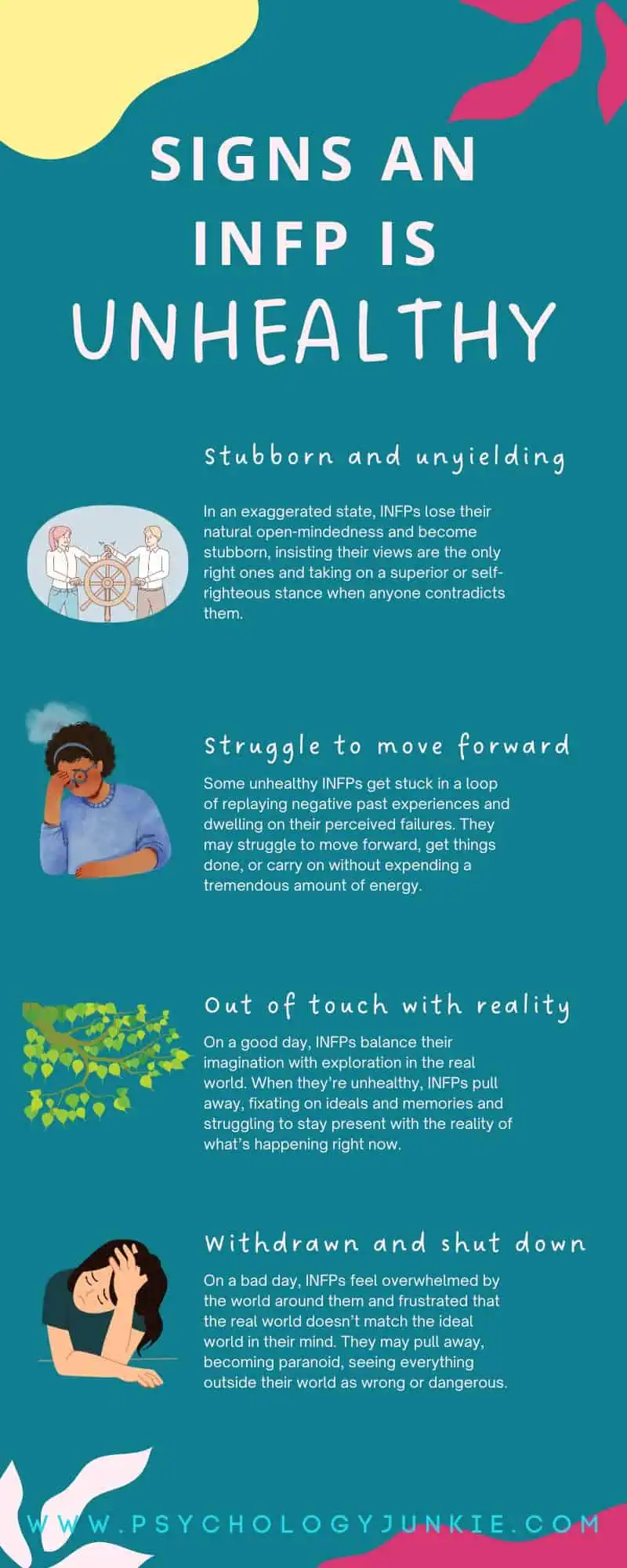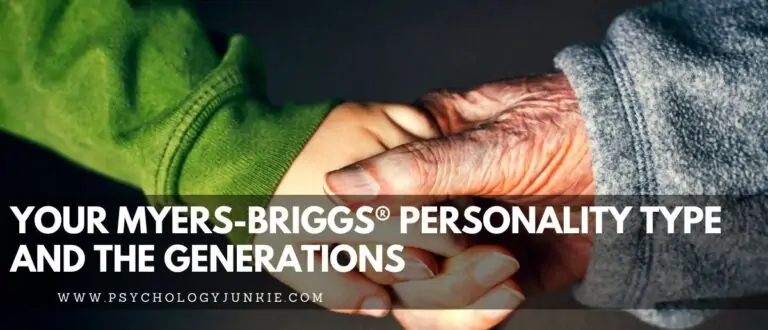The Unhealthy INFP
Worried that you’re going through an unhealthy phase of life as an INFP? Well, you’re in the right place! But first I want to assure you, we all go through phases where we’re not at our best. The fact that you’re here means you’re interested in growing, and that’s a big first step!
But let’s talk about what it means to be “unhealthy.” There are many different ways an individual can become unhealthy. Stress can trigger an unhealthy “grip” reaction. Life experiences could lead to one-sidedness. Dysfunctional relationships can play into someone’s level of maturity. There are also personality loops; in the case of the INFP, this would be the Fi-Si loop. So while one INFP might display a certain set of unhealthy behaviors (being self-righteous, judgmental) another might have a totally different set.

Let’s look at some of the most common signs of an unhealthy INFP and go from there.
Not sure what your personality type is? Take our new personality questionnaire here. Or you can take the official MBTI® here.
This article contains affiliate links. If you purchase an eBook from one of my links I get a small percentage back to help run my site.
Table of contents
Estimated reading time: 10 minutes
The Healthy INFP
Healthy INFPs are deeply in touch with their values, morals, and ethics. They are compassionate individuals who strive to live authentic, meaningful lives. Imaginative and creative, they’re capable of dreaming up worlds that astound and enlighten people. Many of them care for the plight of the “underdog” or the marginalized and try to help those they see as vulnerable. They tend to be idealistic and open-minded; focusing on the future and what they can do to improve the world for themselves and the people they care about.
The INFP Cognitive Function Stack:
Dominant Function: Introverted Feeling (Fi)
Auxiliary Function: Extraverted Intuition (Ne)
Tertiary Function: Introverted Sensing (Si)
Inferior Function: Extraverted Thinking (Te)
5th/Opposing Role: Extraverted Feeling (Fe)
6th/Critical Parent: Introverted Intuition (Ni)
7th/Trickster: Extraverted Sensing (Se)
8th/Demon: Introverted Thinking (Ti)
Some INFP Weaknesses:
INFPs will naturally value their top three cognitive functions a great deal (especially their dominant function). Like all types, they are at risk of having a warped perception of their other 5 functions (Yes, we DO use all 8 cognitive functions). As a result, INFPs can see their inferior Extraverted Thinking as overwhelming, domineering, or too hasty to decide or take action. They can repress this function, ignore it, or devalue it in other people if they’re not careful. This is especially true in childhood and adolescence when the inferior function is less accessible.
Because Extraverted Feeling runs in the opposite direction of the INFP’s dominant function (Introverted Feeling), they can risk seeing it as intrusive, interfering, phony, or desperate to be liked. INFPs are at risk of misreading the intentions of extraverted feeling types.
Because Introverted Thinking is the INFP’s 8th function, they can risk seeing it as overly impersonal, detached, cold, and formulaic.
All of us, regardless of our type, need to be aware that all the cognitive functions are useful and valuable. There isn’t one that is inherently better than another! This way we can improve our relationships with other types who process things differently than we do and form better relationships.
The Unhealthy INFP

Unbalanced Feeling
INFPs who are especially unhealthy or immature can function with a warped introverted feeling process. They may become overly-sensitive, quick to take offense, and insistent that only their views and values are valid. Unhappy at the world and others, they tend to feel resentful and isolate themselves, only letting people in who share the same views. They may appear self-righteous and attached to the idea that they are somehow better than the rest of society, or a misunderstood “misfit”.
INFPs who fall into this category have usually not had a healthy childhood or background with which to develop and appropriately express their functions. Usually, INFPs are very open-minded and gentle individuals, but if they’ve had to be in a defensive stance for much of their life they may not be able to develop their supportive functions (like intuition, sensing, or thinking) to balance feeling and create a healthy mindset.
Why Extraverted Intuition is Crucial for INFPs
To avoid getting into this warped perspective, it’s important for INFPs to develop their auxiliary Extraverted Intuition. This function provides a balance for feeling. When feeling says “this is my value, it is right”, Ne says “hmm….let’s look at other perspectives and ideas and make sure we’re open to new information”. When feeling says “that doesn’t feel right to me”, Ne says “things are complex, maybe there’s a connection or something we’re missing here”. Ne helps the INFP to keep an open mind, see creative connections, possibilities, and new perspectives.
Unbalanced Intuition
But what happens when intuition is unbalanced or unhealthy? When this happens, the INFP will use their Extraverted Intuition to create an idealized image of what the world should be and to form inspirational ideas of a perfect future. Unhealthy intuition can make the INFP seem unrealistic, impractical, eccentric, or ungrounded. They will feel pulled towards an idealistic future, yet they will feel unable to actually do anything to make their goals a reality. Repression of inferior thinking is part of the problem here; Te (extraverted thinking) is very focused on productivity and “making things happen”. When INFPs repress Te too much, they can get stuck in a place of speculation and idea-generating without actually putting their visions to work in the real world and creating a course of action. They can get very frustrated because they see a perfect future and so many possibilities, but they don’t know how to make any of their ideas actually happen and they are afraid to decide and move forward. Really, this is a combination of unbalanced intuition as well as undeveloped extraverted thinking.
The Defensive INFP
If unhealthy INFPs are dealing with threatened values or viewpoints that oppose their own, they can:
A) Repress their own feelings and try to convince themselves that everything is okay.
B) Go the other way and imagine that others are all corrupt, thinking badly of them, and deluded. They may see themselves as the only people who see “the truth”, or the only people who really care to make a difference in the world. They can become especially harsh and critical of others and take on a martyr role, gradually secluding themselves from other people.
More Mild Expressions of Imbalance/Unhealth:
Not every unhealthy INFP is going to fit the exact descriptions above. They may struggle with certain issues mentioned, or they may have more minor “symptoms.” Here are some other weaknesses to look out for.
Because INFPs value introverted feeling to such a strong degree they can risk over-using it or relying on it at the expense of the other functions. They can “dig in their heels” in support of an ideal and can be very critical of those who don’t share the same ideals or who don’t live up to their hopes and vision. They can become so attached to a type of social justice that they see everyone with different viewpoints as unethical or “cruel.”
Because Introverted Sensing (Si) is the tertiary function of the INFP, they can have diminished access to it in early life or they may exhibit immature expressions of it at times throughout life. In early life they can have trouble remembering details. As they get older they can become overly-focused on reviewing the past, getting stuck in particularly bad or embarrassing memories and feeling shame or anxiety about those memories. They may also rely on their own experience too excessively, using that experience to back up their feeling judgments. They may discount other people’s experiences because they are so different from their own. This tends to happen when INFPs are in a Fi-Si loop and they don’t have the balancing power of Ne to inform their perspective.
The “Grip” Stress Phase:
INFPs who are experiencing chronic or extreme stress may fall into the grip of their inferior function, Extraverted Thinking (Te). When this happens, their other functions become less conscious and they seem as if they are “not themselves”. If you suddenly see an INFP “flip a switch” and act in uncharacteristic ways, it’s possible that they are in a grip phase of their life.
INFPs, who are normally open-minded, compassionate and empathetic, become increasingly rigid, structured, and harsh when they are in the grip of Te. They can become sarcastic towards others and harshly critical of their perspective or viewpoint. They may seem overly-focused on efficiency and maintaining control of their outer environment.
If you think you or someone you know might be dealing with a lot of stress, you can find tips specifically for their type here.
The Effect of the Shadow Functions:
Every type can feel lost when dealing with their 5th-8th functions. These “shadow functions” are more unconscious to us and harder for us to use in a conscious, effective way.
5th/Extraverted Feeling:
INFPs can bristle at demonstrations of Fe, seeing it as overbearing, or overly conformed to social values. As a result, they can become stubborn about how other people affect or “impose” on them and can resist being responsible for the social harmony of “the group”. Simultaneously, they can have moments of being very tapped into what other people need and how to meet the needs of others.
6th/Introverted Intuition:
Because Ni fills the “critical parent” role, INFPs can use it as a way to criticize their own perspectives and plans. They may get locked into negative thoughts about how events will turn out. They can also have moments where Ni truly shines in them and they are able to find a sudden clear, positive vision that they can go after with determination and certainty.
7th/Extraverted Sensing:
Extraverted Sensing fills the “trickster” role. As a result, INFPs can fool themselves (or others) by using perceived “realities” to back up their experiences and judgments. They will often use this in a way to catch people in “double binds” or situations or arguments they can’t win. At times, however, they can also tap into Se in a healthy way and use it to enjoy the physical world, notice beautiful details without reading into them, or experience physical thrills.
8th/Introverted Thinking:
Introverted Thinking fills the “demon” role. As a result, INFPs can completely ignore definitions and logical consistencies; adhering to certain principles without seeing the fine distinctions between them. They can also become critical of other people’s inconsistencies and flaws in logic. Even though this is an area where they struggle, they will tend to hide it as much as possible or avoid thinking about it themselves. They may also see people who use Ti as cold, detached, or uncaring. That said, at times INFPs can tap into Ti in a healthy way and find universal principles that can benefit them in their daily lives.
You Might Also Like These Articles:
24 Signs That You’re an INFP, the Dreamer Personality Type
Your INFP Personality Type and Your Enneagram Type
10 Things INFPs Need in a Relationship
Can Childhood Trauma Impact Your Personality Type?
I Hope This Was Helpful!
Each type can be healthy or unhealthy or somewhere in between! Do you have any input or experiences you’d like to share with other readers?
Find out more about your personality type in our eBooks, Discovering You: Unlocking the Power of Personality Type, The INFJ – Understanding the Mystic, and The INFP – Understanding the Dreamer. You can also connect with me via Facebook, Instagram, or Twitter!










I loved this article! Super helpful. Could you possibly write an article about the unhealthy ESFJ?? I know someone who I think is an ESFJ, but often times they act like what I would believe an unhealthy ESFJ would act like.
Absolutely! I’m planning to write an article to describe the different ways each type can be unhealthy. It may take me a while to get through all of them though 🙂
Distilling the essence of the deep
Hi Susan,
Please forgive the length of my post, but if I don’t share with someone who may understand me fully, I will literally burst. I’m sharing a few thoughts after dwelling on the writings of C.G. Jung in Psychological Types, John Beebe in Energies and Patterns in Psychological Type The reservoir of consciousness, Isabel Briggs Myers in Gifts Differing, David Keirsey in Please Understand Me II, Dario Nardi in Neuroscience of Personality, Naomi Quenk in Was That Really Me?, Paul Tieger in Do What You Are, and Marti Laney in The Introvert Advantage How to Survive in an Extrovert World along with massive amounts of Internet reading of which you are an increasingly important resource to me in how you relate to others so well in your personality articles. You resonate, girl! Keep up the good work. I will enjoy watching you mature in your thinking and writing.
I’m an almost 56 year old INFP who first took the MBTI not quite a year ago and have only recently understood everything as of a month or so ago. That’s another long story, and I have something far more important to share. I have spent 35 years working in an extroverted world as an inverted INFP, which means I have been masquerading as an ESTJ, a very negative ESTJ, since, cognitively speaking, I have been operating upside down for a long time, hurting myself, and definitely hurting others. Let me explain, please.
By the time we are two years old, we have already selected and begun practicing our dominant, or preferred, function. Because we prefer that particular function, we gravitate toward that function. Why? The lure of the proverbial carrot always leads us in that direction. How? Extroverts get a hit of dopamine by actively exercising their dominant function which produces adrenaline and ultimately dopamine, and introverts get a hit of acetylcholine by passively accessing their dominant function (See Laney, Ch 3.) Who? All of us are like drug addicts looking for their next fix, or happy hit. When? Once the two year old in us knows what feels good, we never stop trying to access or exercise our dominant function. It’s better than ice cream or candy! Where? Again, all of us will seek any environment in which we can access or exercise our dominant function; however, there is a problem, a major one.
As small children, we are introduced to a world that does not understand anything about what makes each of us individual and unique. After we try to interact in an environment that is not conducive to our dominant function and for which we are fully unprepared, we are prevented from accessing either dopamine or acetylcholine. Think about it. The extrovert is expected to sit still during class–no movement, no adrenaline, no dopamine–, and the introvert is expected to manage stimulatory overload–no solitude, no silence, no acetylcholine. Those who do not cooperate are compelled to comply. While we’re at it let’s ladle out labels for everyone and be sure to add extra helpings of helplessness, frustration, shame, fear, doubt, and insecurity along with a host of other ills.
It is my opinion this early in the game (and I am not alone–see all of the authors above and please include Marie-Louise von Franz along with a veritable host of all those seeking to heal those who are hurting) that the pain in this world is nothing more than a gross misunderstanding of the MBTI and the way we function cognitively. Carl Gustav Jung was right! He was right in the way that few people are. I am thankful that God had mercy on me (1 Timothy 1:12-16) and that I am one of those who recognize the significance and truth of the MBTI. Isabel Briggs Myers was certainly a believer. Where would we be without her devotion and brilliance in bringing the MBTI to the masses? As I read various comments and postings on the internet, I am confident that misunderstanding yet abounds.
Based on what I have stated above, how may we apply it? As we know, in order to enjoy a healthy and happy personality, our mental energy should be distributed in the following proportions to achieve cognitive balance:
Dominant – 70%
Auxiliary – 18%
Tertiary – 8%
Inferior – 4%
For me, as an INFP in a conscious 16-hour day after having rested 8 hours in blissful, restorative sleep, this translates to:
Fi – 10-½ hours
Ne – 3-½ hours
Si – 1-¼ hours
Te – ¾ hours
I hope you noticed that I should be introverting around 12 hours a day and extroverting around 4 hours per day (Extroverts, vice versa.) In the real world, my world, and your world, it may seem too lofty an ideal, merely a mirage or flight of fancy. But I am here to tell you that you can work toward achieving this. I’m trying to limit my extraversion at work to three hours, so I have an hour to take home to my wife. In order to pull this off, I have to find a hiding place to work in solitude, I have to get creative with my job description and duties, and I have to convince my superiors that I am actually doing something productive. Ultimately, the results will speak for themselves, and I get to use my natural, preferred strengths and enjoy what I do. No more masquerading as an upside down INFP-ESTJ imposter, an evil ESTJ, a chronically fatigued ESTJ, a highly unproductive ESTJ! Can you say, “Hello acetylcholine?” or “Hello dopamine?” Let’s get happy and count our blessings!!!
Christ said, And ye shall know the truth and the truth shall make you free (John 8:32 KJV.) The freedom to be yourself, your own individuated Self in Jungian thinking, the one God made in His own image, must reign supreme in this world if ever we are to break from the bondage of sin. Apart from knowing and obeying God, there is nothing more powerful in this world than knowing and being yourself. You cannot know God and you cannot know others until you know yourself. If a man say, I love God, and hateth his brother, he is a liar: for he that loveth not his brother whom he hath seen, how can he love God whom he hath not seen? (1 John 4:20 KJV)
We cannot know ourselves or others until we understand the cognitive functions and way in which we use them. Only then can we love, respect, and appreciate one another the way God intended. When you find your true self, the negative will simply disappear, and the positive will take its rightful place of preeminence in your life. Imagine the difference when the pebble of positivity drops in the pond of purity, peace, and prosperity, and the new reality of recognition, respect, and rightness ripples out into the world around each and every one of us.
I just want you to know, you just changed my life and this was very helpful and constructive to my situation.
-anonymous INTJ learning to love an INFP
Please permit me to share what a healthy INFP is capable of feeling…. A small glimpse of the real me, and yes, I know pain, for I have spent many years embracing it, intimately ?
A Collector of Tears.
I am a Collector of Tears. So many have been shed! God has given me a love infinitely deep and pure so that my well of precious, healing tears might never run dry. Taste my tears and discover your own. Unburden your torn, aching heart and let it sing its siren song of wistful longing–and belonging. Do not be afraid. Come to me. Come to me and let them fall, one tender, inexpressibly silent drop at a time . . . .
Isn’t it wonderful to know a male INFP is taking on the world?
For he has a tear to soothe every sorrow, and more than enough love to fill the dry, lonely, unloved place we know as the heart with grace, acceptance, and healing.
In love and appreciation of the beauty that lies within us all,
Gilbert
This is beautiful! Thank you!
Gilbert, my ex was magical at generating and harvesting tears of mine. I’m glad that someone else is taking on this challenge, as mine were to feed a narcissistic reality, and only worked in his favor, and made him feel better. As for me, I’m smiling and laughing in joy now. Thank you.
I would love to read some posts about friendships between different types… specifically, I’m an ESFJ and my older sister/best friend is an INTJ, and it’s very challenging for me to understand how to be a good friend to her! I naturally want to help her with everything and make sure she doesn’t forget or mess anything up, but she bristles when I “tell her what to do”. I guess I’m challenged to find a way of being helpful other than helping with things… Anyway, I’d love to hear your opinion!
Could you help me on how to balance the functions and try to be a healthy infp?
I think the main thing is to try to focus on developing your dominant and auxiliary function the most, and then spend a little “play” time each day working on the tertiary and inferior function. This article might help! https://www.psychologyjunkie.com/2017/10/20/weak-spot-every-myers-briggs-personality-type-strengthen/
I think being aware of one’s own strengths and weaknesses is an amazing first step!
Female, 45. South Africa. According to all these tests I’ve been “playing” with, I too am INFP. An unhealthy one, at that. I have been diagnosed with Bipolar II disorder and have been on (and off) meds … for being … well, me. So these tests tell me.
I have been misunderstood, ( yes, and it is not a figment of my “over active imagination”, halucinations, over-sensitivity, bla bla bla.)Misunderstood. I am UNHAPPY. Deeply dissattisfied with me, .. the whole human race at large … trauma marked my life repeatedly. Suicidal ideation is becomming a constant. I have to actively divert my thinking towards my work, to get some of my work done. My mind runs in loops, ideas flood it, means to impliment positive progress is lacking. I can dream it up, but can’t seem to make it reality. …. Everything I read tonight paints the picture of ME. Not once in all of this, did anybody refer to bipolar disorder. You explained what I have and am experiencing since I can remember. And for just as long, I’ve been told that there is something wrong with me.
Can you imagine my reaction to all of this? I am angry beyond belief, relieved, surprised and … I have no words to express the rest of what I am feeling all at the same time. I want to thank you, smack you, hug you, cry at your feet and beat you … for changing my “reality,” which now seems to be the reality of others and not mine at all. I want book a year of classes as you the teacher tobteach me how to cope with “me”. Because I am told that I am “off”. And you tell me I can be fixed. I also want to delete this app abd try to forget I ever read any of this.
And now I am going to bed. at 00:28. to cry. for me and me and al the me’s I apparently have that I didn’t know about. It reads “me”, and it feels right, but it is scary . freekishly frightening and it is time to hide. Good night. Thank you.
Have a question this was helpful if you are the info but are there ways I can help my son whom is an infp and Asperger’s ? And just in general can you offer ways for others to help, with these articles about the various unhealthy types? Can’t wait to see the entp article and thanks so much!
I started to study my type a little more recently, but I just do not believe that I found an article that described with incredible accuracy all the problems I’m going through. The description is perfect, including the description of how I am seen by the people with whom I live most. Thank you for writing it.
Susan,
This site and your posts have been so helpful to me lately! Especially this one! Inferior Te has caused me to feel very stagnant and frustrated lately. I definitely feel stuck in a loop but maybe I have enough insight now to get out of it.
Thank you so much for putting this info out there! I’m so glad I found this site.
–m
What are some good cities for an INFP to go to school and live in?
I live in San Francisco and love it. Been here 3 yrs. It’s expensive but I got lucky. It’s such a beautiful city (if you can tolerate all the homelessness)
I’m a 49 year old male infp seeking effective guidance. I have relied on myself to figure things out up to this point and if you could only see where that has taken me! I went to a therapist once and felt it benefitted me in the sense that I “unloaded” a bit. I did not go back because the therapist did not seem to understand how to help me. Now that I have discovered I’m infp and having read your article, I would feel confident going to a therapist with knowledge of infps. Is there a way to find such people online or even better on location in my area that can perhaps help me? I want to whatever time I have left more enjoyable and less a struggle.
Thanks for any direction you may provide.
I am an INFP. What I have just read today is quite true especially for myself. I was wondering to myself if there are such theories about what I am. So I found this page. I somehow fit in as the unhealthy INFP. Things that I do or said, I may not realize it but no, actually I do know and its difficult to control. Most of the time I see myself as cold-hearted, feeling superior based on my past experiences, or knowing that I am capable of being extremely independent that I dismiss the help, opinions or suggestions from those who are close to me. I am like this person with split personality. I can be positive, daydreaming and smiling, being nice and kind and loving to people today and the next I shut people away harshly. I throw tantrums too and I can go extreme like disappear myself and the next day being calm or talking to someone without expressing any emtions. I see myself as confuse at times, angry on some days or “zombie-mode.” Either Im this or that. It depends on where I am or whom Im with or totally a different situation. I am ok when there’s nothing intrusive that trigger the hidden pandora box at the back of my mind or heart.
I have so many things to share but thats all I can summarized.
If you try to avoid those dark sides, try to dp Meditation and those activities. Also try to find people, who are very supportive, calming, not to critical (or just in a very objective manner like INTJ’s) and love you for who you are. That’s what helped me to get me thrpugh my dark periods and I feel quite happy know. 🙂
Try to do meditation and other calming activities and calming, supportive people, who are rather non-judging (or very objective in iz like INTJ’s), who best case really love you for who you are. 🙂
Wow! I relate to this behaviour so much. It feel like I am not a normal person and about the split personality, I felt the same way to. People find it hard to understand me and me on the other side doesn’t understand myself either.
Love this! My mom is an Infp and I am an Enfp. I would love to see an article about the unhealthy Enfp. Thanks!
I actually found the explanation to my behaviour and actions to a fair extent in this article.
Im an INFP type and the description of the unhealthy type explains a lot. I have found myself being that way unknowingly but still kind of knew deep down. I shut people that didn’t think like myself. I didn’t admit it until now but now I guess it’s important to address the problem too so yes I did think my ideology was right and I instantly closed the door at anything slightly out of my comfort zone. Being critical ,yes I do point out the faults a lot. I have been called out on being too critical but I only get more defensive and triggered by being called out.
I noticed I may act rude sometimes and get extremely calm and kind the next second. It also depended on who I’m talking to. I for a while thought I could have multiple personalities.
I want to understand others but not get out of my comfort zone too so that makes me even more frustrated in general.
I am an unhealthy INFP and I wish everyday that I was never born due to the incessant obnoxiousness of life
I guarantee you are a valuable part of this world! I hope that you find something that brings you joy and belonging soon!
Same. But I’ve noticed It’s been almost a year now since you posted your comment. I hope you’ve healed, man.
Jung never talks about a “Fi-Si” loop and the MBTI metrics never demonstrate this dynamic. If you want to know more about neuroses, and psychological disorders, study the DSMV which is empirical.
Problems with the past are not (Si) tertiary, inferior or “Demon”. It’s just more often the trend of depressive, schizoid, avoidant, or people with PTSD who are overrun with negative memories. That’s why people drink on their own, that kind of thing … Just more often introverted people.
It’s too easy to say it’s “(Si) or (Fi) in this position”. Because you can always argue that (Si) or (Fi) has a strong negative weight depending on its upper or lower positioning.
I don t think that the functions order is a rule, I once had the 8 functions order test ,
and Fi,Ne,Ti,Se are the top 4 functions
Is that possible anyway?
Really good article. Very well written and insightful. I certainly wouldn’t want to come across as the only person who sees truth because I know it isn’t true. As idealists we have to be cognizant of that and stray from arrogance and dogma.
You said,
“When INFPs repress Te too much, they can get stuck in a place of speculation and idea-generating without actually putting their visions to work in the real world and creating a course of action. They can get very frustrated because they see a perfect future and so many possibilities, but they don’t know how to make any of their ideas actually happen and they are afraid to decide and move forward. Really, this is a combination of unbalanced intuition as well as undeveloped extraverted thinking.”
This is where I am right now, and feel like I’ve been in this rut for a long time. My question is, How do I get out of it?
Eight functions are really practical? They’re very generalized, and I wonder on what basis they’re formed at all. Based on the techniques, I have to have personal values and personalized everything. While I’ve never personalized anything before (maybe a few small ones, but certainly everyone did at times) I really read once in an article that the fi function unfortunately can’t have a logical look at things. whereas I’ve always had a logical and emotional look at things. And the interesting thing is that healthy infp personality is exactly what I’m afraid of becoming. Actually, I totally accepted mbti, but when I met the functionals, I was quite confused, are they just pseudoscience? I don’t know if the fi function is scientifically correct. But I know fi is kind of selfish.
I am an INFP and my daughter is an INTP. We mostly have an excellent relationship. When we have a problem we become stuck. Neither of us know how to move forward. The problem/situation becomes the elephant in the room. What worsens our situation is she is an LMSW with othe distinctions, and I am an author. Which stays true to our types. How do we work our way out of these thorny spots? I would love to see you do an article in your blog on this type of clash.
I am writing a book about chronic pain and one of my chapters is about how different personalities deal with chronic pain. I would love your insights on this. I would be more than happy to reference your information in my book